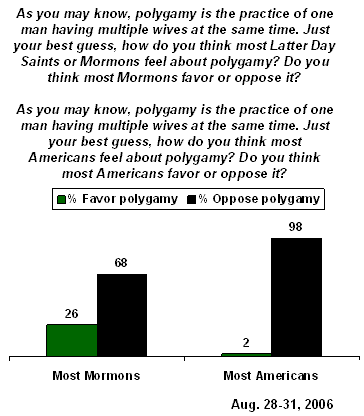GALLUP NEWS SERVICE
PRINCETON, NJ -- A recent Gallup Panel survey shows that Americans are much more likely to believe most Mormons endorse practicing polygamy than to believe most Americans support it. A solid majority of Americans, though, feel both groups oppose the practice. Americans living outside the West, those with no college education, and frequent church attendees are more likely than others to associate Mormons with support for polygamy.
Polygamy has been at the forefront of the news in recent weeks with the arrest of polygamist sect leader Warren Jeffs, the leader of Fundamentalist Church of Jesus Christ of Latter Day Saints since 2002. Jeffs was arrested late last month on charges of sexual misconduct with minors for allegedly organizing marriages between minors and older men. The relationship between Mormons and polygamy has also been reinforced by the introduction of the HBO television series Big Love, which tells the story of the family life of a polygamist man and his three wives. Polygamy, the practice of a spouse of either sex having multiple mates, is illegal in the United States and was officially outlawed as a Mormon practice over a century ago.
The poll, conducted Aug. 28-31, 2006, measured Americans perceptions about the acceptance of polygamy using a split-sample technique where one half of the respondents were asked about "most Mormon's" acceptance of polygamy and the other half were asked about "most Americans'" acceptance.
Roughly one in four Americans say "most Mormons" support the practice of polygamy; only 2% say "most Americans" support it. A solid majority of Americans feel Mormons (68%) oppose it and nearly all say this of Americans generally (98%).

The notion that the majority of Americans say others oppose polygamy is not necessarily a new concept. Previous Gallup research finds that few Americans say polygamy is a morally acceptable practice. Most recently, in May of this year, Gallup found only 5% of Americans saying polygamy is morally acceptable and 93% saying it is morally wrong.
Certain groups of Americans are more likely than others to believe that most Mormons support the practice of polygamy:
|
Most Mormons Favor or Oppose Polygamy? |
||
|
Most |
Most |
|
|
% |
% |
|
|
Region |
|
|
|
East |
31 |
60 |
|
Midwest |
27 |
65 |
|
South |
30 |
65 |
|
West |
15 |
82 |
|
|
|
|
|
Education |
|
|
|
No college education |
31 |
63 |
|
College educated |
20 |
75 |
|
|
|
|
|
Church Attendance |
|
|
|
Attend at least monthly |
33 |
63 |
|
Attend seldom or never |
19 |
74 |
Only 15% of Americans residing in the West say most Mormons endorse polygamy. This percentage is much higher among those in the East (31%), Midwest (27%), and South (30%). This may be due to the fact that Mormons are much more likely to reside in the West than in any other area of the country and may thereby be more familiar with their official teachings.
Americans with higher levels of education are less likely than those with lower levels of education to associate most Mormons with support for polygamy. Twenty percent of those who have at least some college education say most Mormons support polygamy, while 31% of those with no college education feel this way.
Americans who attend religious services at least monthly (33%) are more likely than those who seldom or never attend services (19%) to say most Mormons endorse polygamy.
The results to the question of supporting polygamy show little difference between Protestants (30%) and Catholics (27%), Republicans (28%) and Democrats (26%), men (25%) and women (28%), and adults under aged 50 (24%) and those aged 50 and older (29%).
There are essentially no differences among any of these demographic subgroups in views that most Americans support polygamy.
Survey Methods
Results for this panel study are based on telephone interviews with 1,001 national adults, aged 18 and older, conducted August 28-30, 2006. Respondents were randomly drawn from Gallup's nationally representative household panel, which was originally recruited through random selection methods. For results based on the total sample of national adults, one can say with 95% confidence that the margin of sampling error is ±3 percentage points.
For results based on the 506 national adults in the Form A half-sample and 495 national adults in the Form B half-sample, the maximum margins of sampling error are ±5 percentage points.
In addition to sampling error, question wording and practical difficulties in conducting surveys can introduce error or bias into the findings of public opinion polls.
Q.8-9 SPLIT SAMPLED
8. As you may know, polygamy is the practice of one man having multiple wives at the same time. Just your best guess, how do you think most Latter Day Saints or Mormons feel about polygamy? Do you think most Mormons favor or oppose it?
BASED ON 506 NATIONAL ADULTS IN FORM A
|
Favor |
Oppose |
No |
|
|
% |
% |
% |
|
|
2006 Aug 28-31 |
26 |
68 |
6 |
9. As you may know, polygamy is the practice of one man having multiple wives at the same time. Just your best guess, how do you think most Americans feel about polygamy? Do you think most Americans favor or oppose it?
BASED ON 495 NATIONAL ADULTS IN FORM B
|
Favor |
Oppose |
No |
|
|
% |
% |
% |
|
|
2006 Aug 28-31 |
2 |
98 |
1 |